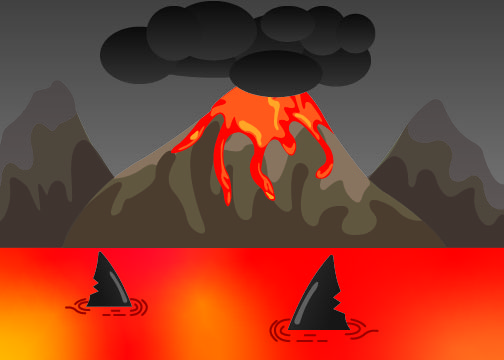Sharks Are Living in Volcanoes?
October 23, 2020
In 2015, Brennan Phillips, a biological oceanographer, headed to the Solomon Islands to observe hydrothermal activity. However, what he ended up finding was something he never expected; sharks were living in volcanoes. Interestingly enough, such an insane news story barely saw the light of day. Was it a hoax? After more research, there seemed to be very few reports on this massive discovery until a few weeks ago, when National Geographic released their documentary for ‘Shark Fest,’ “Sharkcano.” The work of Brennan Phillips was amplified and new discoveries were made and now displayed in 2020. But why is this still not getting attention? How are sharks even living in volcanoes?
Back in 2015 when Phillips visited the Kavachi volcano, the most active volcano in the Solomon Islands, he was shocked to discover sharks and stingray were living within the crater. Forbes Magazine explains how “he found bull sharks taking advantage of the turbulent water caused by the submarine volcano, using it like a cloak of invisibility to better ambush prey.” At the University of Rhode Island on Sept. 4, an Oceanography professor sat down (virtually) with Brennan Phillips to talk with him more about his discoveries. Phillips explained how he and his team expected nothing to be living inside of the volcano at all, “probably some really cloudy orange water,” he stated. However, he was extremely surprised when they touched the camera into the crater of the volcano and they saw a lot of animals that were on the outside of the volcano also on the inside. He said, “Their presence in the volcano really makes no sense,” as the water is turbid, very warm, and fluids coming out of the volcano cause skin burns. All of these factors should make a volcano a horrible place to live for sharks.
After finding out this new information about sharks, many questions arose, such as, why were sharks choosing to live in this harsh environment? Mike Heithaus, a marine ecologist, did an experiment to try to better understand the answer to that question. Forbes Magazine further illustrates that “according to Heithaus, volcanic islands like Guadalupe are appealing to sharks due to the abundance of nutrients that flows into the surrounding water, which helps boost the environmental food chain from the bottom up.” In the National Geographic Documentary, ‘Sharkfest,’ Heithaus and his videographer partner, Duncan, set up an experiment where they simulated volcanic conditions to try to see how these Bull Sharks were finding food in such cloudy and turbid water. They soon discovered that the sharks had no issue. In fact, they saw that the sharks thrive in the turbid volcanic environment. They used the phrase that it was like “turning the lights out for their prey,” something Phillips had brought up five years ago.
In interviews with students, none of them knew that sharks even had the capability to live in a volcano. Junior Conor Pocinwong even said, “That’s impossible. There is just no way.” It confused me that a topic so critical to the environment and marine life world was so buried within the news. I also wondered why it took so long for scientists to find this out. Senior Shristi Hamal brought up the idea that it has taken so long because no one would have expected there to be any life in volcanoes at all. She stated, “When I think of volcanoes, I don’t think of life. I think of hot lava, an environment I wouldn’t imagine any sort of creature being able to live in.” Freshman Nick Anderson agreed in saying that scientists probably did not have much reason to look in volcanoes if their hunch was that no life could sustain living in that environment anyways.
Another question was brought up by sophomore Heather Gow. What do the sharks do if the volcano erupts? The Kavachi volcano is one of the most active in the world, yet home to many sharks. In an article by JPost, they explained that Heithaus “hypothesizes that the key may be the ampullae of Lorenzini, a cluster of pores found on their snouts, which he suspects provides sharks with a sixth sense of sorts that can detect changes in the planet’s magnetic field. This, in turn, would allow sharks to detect volcanic eruptions ahead of time.. Sharks have been known to be able to detect hurricanes and other natural disasters so it would not be a total shock if scientists were to discover Heithaus’ hypothesis true. This is incredibly interesting because it demonstrates how fascinating sharks truly are. There is so much that the world has to know about aquatic life and the mysteries of sharks.
The idea of sharks living in volcanoes is truly astonishing and has led to a lot more research being done on these underwater volcano environments. Inside, sharks are safe from overfishing and have abundant prey far from land. Hopefully more studies will be done in the future to tell us just how sharks are able to sustain the environment inside these overheating craters. Overall, it truly demonstrates how little humans know about what goes on in the bottom of the sea, and how much there is left to discover.





Christine Richmond • Oct 23, 2020 at 9:54 am
I loved this article about the sharks. Who knew?! I have not seen any news about this either. Fascinating stuff and very well written. Keep it up.